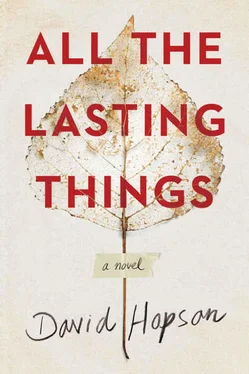A pleasant smell at first, wood, a neighbor lighting a barbecue or burning branches in the yard. Max breathed it in greedily, but after a moment it grew into something else, becoming thicker, more complicated. He couldn’t parse the scent, but something other than wood burned. He erased the notes he’d just written, cuffed the rubber shavings onto the grass, and poised his pencil to go at them again. The cellos, yes.
He wrote without stopping until, at last, the coming sound of it, the hiss, a gunfire pop! made him turn. His eye, still half-expecting a silvery scarf of smoke from a neighbor’s lawn, the burning of dried branches in a heavy drum, trailed the fences and hedgerows. But no. As soon as he saw it, the radio switched off, and another sound overtook him as the music died. Everything drowned in the cloud of tar-black smoke mushrooming above his grandfather’s house. It swelled through the air, climbing taller than the trees, tattering into thinner gray wisps only at its highest point. Max ran. He ran as fast as he could across the lawn and up the back steps to find the second floor roiling with smoke. Small fires, some growing, some curling and sputtering out, burned from one end of the house to the other. Scattered like a pile of burning leaves, index cards filled with cramped and tightly written words provided the glowing orange ember that turned the shower curtain into a scrim of flame or writhed in corners into harmless curls of ash.
He called Henry. He covered his mouth with his shirt and started toward the study, where the smoke thickened and singed. Fires of varying sizes danced erratically in every room, but the largest was here, in a furnace fed by a thousand books, some of which Henry had thrown to the floor in a madly budding bonfire.
“Henry!” Max called. He heard nothing. Then, to his left, from the couch, came a rough, hacking cough. Plume after plume of smoke moved past him like a row of soldiers with only the slightest space between. He tried to time his passage to the billowing march but missed and, swallowing a fiery mouthful of smoke, fell to his grandfather’s side in a fit of jagged retching.
Henry easily outweighed him by thirty pounds, but Max was young, stoked with adrenaline, and, filling his lungs with clean air from under the sofa, capable of holding his breath for an impressive length of time. He heaved Henry, who was by this time mostly dead weight, into a standing position and dragged him forward. They nearly tripped over a tangle of books strewn across the floor, but fumbled into the hallway, where the smoke thinned and there was air to be had. They careened down the stairs. Both coughing violently, tears scorching their eyes, a rope of clear, pendulous snot dangling from Henry’s nose as they crashed through the screen door and fell with a clatter onto the porch.
A band of neighbors, frozen on the lawn with looks of terror and amazement, snapped to life at the sight of them. Four men who were no longer made for running ran up the steps, two taking Henry, two taking Max, and pulled them onto the lawn, while a clucking cluster of women hovered above, unbuttoning Henry’s collar, wiping Max’s face, assuring them that the fire department was on the way. Henry, still rasping, face smeared with soot, whimpered, “She’s not dead. She’s not dead,” while Max hung his head between his knees, heaving heavily, and, barely able to form the words, told him to shut up. Far away, the wail of a siren.
Between the smoke and the sleeplessness, a wrap of suffocatingly tight sheets wrapped around Max’s mind. He could simply give over to the weight that pulled on him and curl back in a senseless cocoon onto the thick green lawn. But then, like a stroke of lightning, an urgent flash lit him up from the inside. His eyes snapped open. A light, brighter than the flames that lashed the upstairs windows, rent the cloth binding his limbs and made him jump to his feet. He wasn’t exactly thinking of Claudia or the book, but the afterburn of both set him running for the house.
The assembled men, lungs already whistling from their labor, weren’t quick enough to catch him, but one of the more spry women managed to snag his foot, which sent him crashing hard into the porch steps. He knocked his shin but hopped past the shocking pain of it and vaulted, in three Olympic strides, up to the study. The room was hotter than he’d left it, and the smoke came faster now, like filthy water flowing over a breached dam. Max stripped off his shirt and tied it tightly, bandit style, around his mouth and nose before dropping to the floor. Crawling forward with great care, he avoided the hills of burning books and groveled toward the desk.
At first, he didn’t believe it: the safe had burned down. The history of Henry and Jane forever lost. But he felt farther along the bookcase, his sense of spatial positioning thrown off by a good three feet, until his panicked hands came to the hot metal box. His fingers jumped as if they’d found a live coal. He cursed, but again pushed past the pain. A sense of invincibility danced in a flash across his storm-riddled mind, a tonic, an opiate: nothing could hurt him, nothing could stop him. Holding his breath, he snatched off the shirt and used it to pry open the door.
The book was there, curled by the heat but unharmed, and he moved as if extracting it were a child’s game, the steady hand needed to snatch it from its narrow opening without touching the hot surrounding walls, like a kid tweezing the patient’s funny bone without inciting the cruel electrical bzzzzzt in Operation. With the shedding nest of pages in his grip, with every piston firing, he saw an exit route running like a white seam across the room’s deadly black felt, as easy to follow as a runway, out of the smoke, out of danger, a mattress of soft, fragrant grass waiting for him on the other side.
Hugging the shaggy beast of his grandfather’s book to his chest, he flew forward like a sprinter hearing the starting gun. The white trail led out of the room. His eyes didn’t need to be open to see it — the trail, the green, the sky — but his body was a crucial foot off from where he thought it was, and his sneaker caught hard on the base of Henry’s chair. Max snapped forward. His head, with all his momentum behind it, smashed into the corner of the desk. The pages scattered like birds through the room. The heat kited them up and away. They drifted down, falling into flames, feeding them or buckling into brittle shapes of ash.
Max groaned. He lifted his hand to his head, his hair already slick with blood. His eyes fluttered and closed. The smoke drifted above him but sent its tendrils down, knitting the billowing cloud to the fledging fires that thickened it. He coughed himself still then listened. The wood of the shelves popped and snapped. Paper scraps fizzing through the air like comets. The breath of the fire crawling closer to his ear. The closing approach of the sirens. The curtains, the books, the rugs, the walls. Everything falling beneath a roll of orange waves. Everything being swept away with a music all its own.
Benji sat on a crowded lawn in a circle of fifteen students more than half his age. He’d lost track of how he’d gotten there — everything he did happened in a blear — but it wasn’t longing for the programmatic cheer of new student orientation. He felt, as he had every day of the past month, as if a giant hand had picked him up and set him down, morning to night, moving him like a pawn in a game he had no wish to play.
Of course there was no hand. He wasn’t caught in a dissociative fugue. He woke and dressed and ate and ran and shat and showered and slept, but he did it all without any sense of self-propulsion, driven to drama club, to the Cineplex, to Sperry’s for a night with Cat, by the self-preserving sense that it was simply better to do these things than not. He didn’t have to hide his grief, but if he didn’t display proper evidence of coping with it, if he didn’t demonstrate that he understood the word accident and had no cause to blame himself (but who else in the world could he possibly blame?) his mother and Cat would come for him. They’d interject themselves. They would, as if he were a man sinking into the sea, start throwing him lifelines, and their lifelines weighed as much as chains. The last thing Benji wanted was rescue.
Читать дальше












